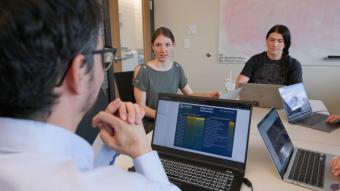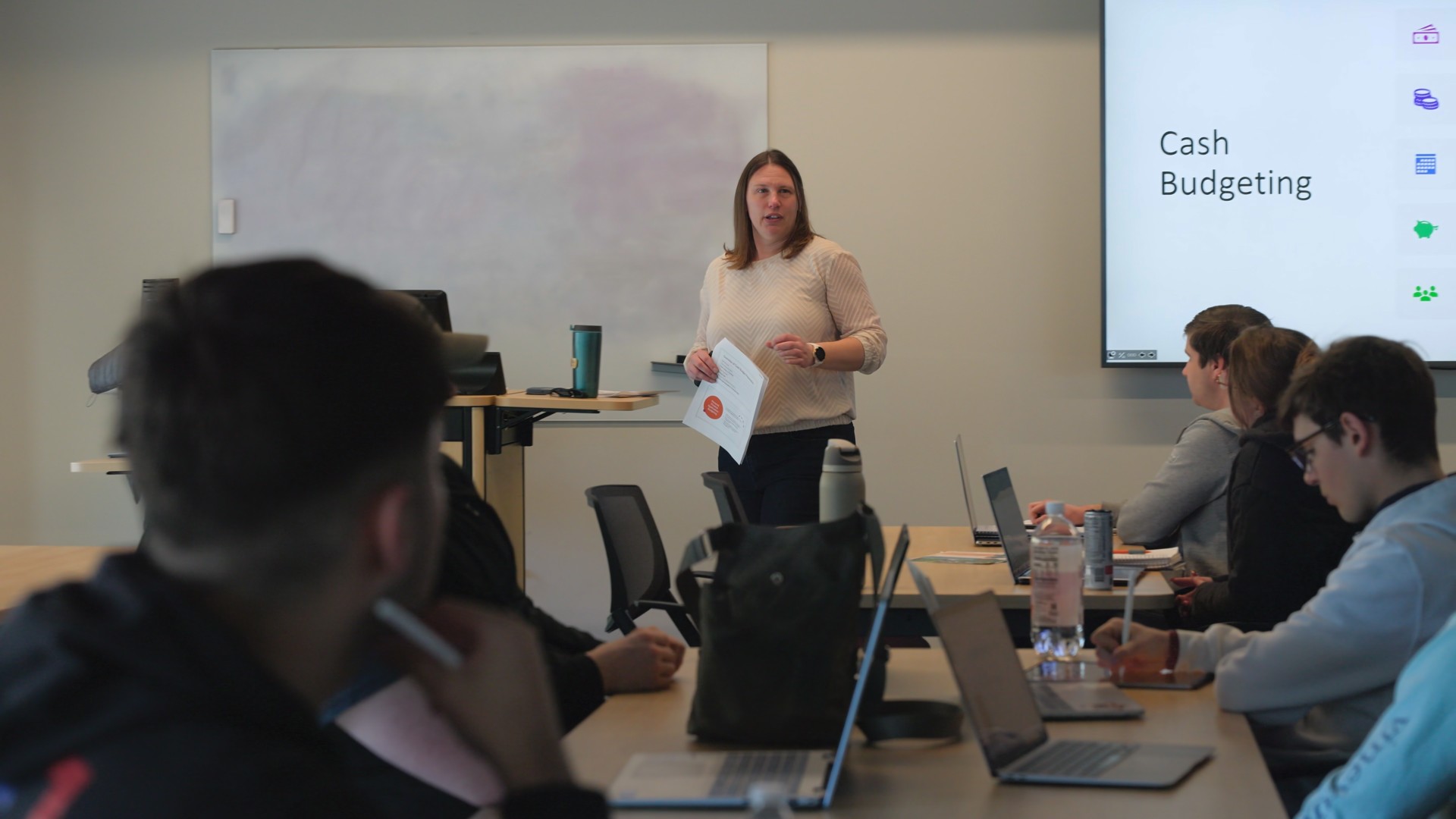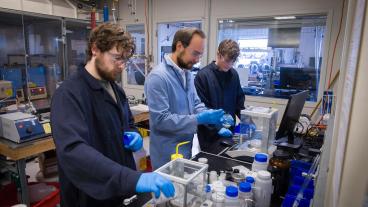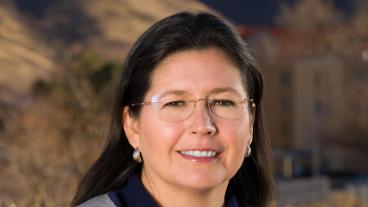
Students in the Business Engineering and Management Science program take the same core classes as every other student at Mines, giving them a strong foundation to build a data-driven and analytics-focused career. (Photo by Tim Meyer/Colorado School of Mines)
Colorado School of Mines produces some of the best engineers in the business. Thanks to a business-focused undergraduate program, Mines is now also producing some of the best engineering-minded business people in industry.
The Business Engineering and Management Science Program at Mines prepares students to make an impact in the business world from startups to Fortune 500 companies and everything in between. Working off a strong foundation in math and science, graduates understand how to identify business opportunities and challenges and break up complex problems into smaller pieces. Additionally, graduates are skilled in constructing, analyzing and interpreting data to optimize business operations and strategic decisions.
“Business engineering is about using the engineer’s mindset to solve business problems,” said Becky Lafrancois, director of undergraduate programs in the Department of Economics and Business. “It’s a data- and model-driven approach to business decision making, and our students learn how to take that approach to solve real-world problems.”
Business Engineering Degree instead of Business Degree
As a STEM-focused university, Mines might not seem like the most obvious place to pursue a business degree. But that math and science focus actually provides a unique value proposition for business-minded students.
Students in Business Engineering complete the same core curriculum that all undergraduates take at Mines – calculus, physics, chemistry, computer science and cornerstone design, plus humanities, economics and wellbeing courses – a much different foundation than more traditional business programs.
The in-depth training on core business skills like accounting, marketing, management and communication that follows comes with added focus on data science, analytics and quantitative decision-making tools. Likewise, some of the classes that undergraduate Business Engineering majors at Mines take are often only offered at the MBA level at other schools, Lafrancois said.
“There’s a very intentional design to our curriculum that provides students with a real tool set that they can use to jump into the workforce and help businesses attack decision making using a wide variety of techniques,” Lafrancois said.
Real-world, hands-on experiences
Like other engineering students at Mines, Business Engineering students participate in a capstone course during their senior year where they can put their skills to use in supporting a client. Capstone projects are sponsored by companies that are looking to solve an organizational challenge. Projects are data-driven and impactful for the sponsor.
“The Business Capstone class provides a unique opportunity for our students to collaborate with an industry partner and their peers. The students quickly learn that real-world data and problems are much more complicated and messier than many of the examples they work with in their other courses. It is rewarding to mentor the students through the process of developing a project scope to preparing and presenting the final deliverables to their clients,” said Lafrancois. “The capstone allows students to struggle through the complexities of a business problem in a supportive environment and to apply many of the skills and tools they have learned over their time at Mines. Not many business programs offer industry-sponsored capstone projects to all of their students.”
Business students at Mines also benefit from their knowledge of engineering and their interactions with engineering students. “There are unique opportunities at Mines to see how you can move forward from an idea developed by scientists and engineers to a product that benefits end-users,” Lafrancois said. “With their understanding of economics, finance, marketing and management, Business Engineers can support more traditional engineers and scientists through the process of getting a product out to market. The opportunity to engage in this process is unique to institutions like Mines, where there is significant collaboration between the engineering and business departments.”
Mines has a robust entrepreneurship and innovation ecosystem where Business Engineering students can apply their skills to real start-up companies. Through the Beck Venture Center, Mines business students can connect with entrepreneurs and work on due diligence for those seeking funding for their newly formed companies.
“Working with startups through Beck is a phenomenal opportunity for students to build knowledge, not only about how startup funding works, but how that process goes from idea to a real business,” Lafrancois said.

Success on the field and in business
The opportunity to gain real-world, hands-on experience in business while also getting a STEM-focused degree from Mines was what attracted football player Logan Rayburn ’23 to the program.
Coming out of high school in Dallas, where the oil and gas industry has a strong presence, Rayburn knew Mines’ reputation in that field and began at the university as a Petroleum Engineering major. But it just didn’t feel like the right fit for him. When the Business Engineering program launched in Fall 2021, he switched majors as soon as he could, enrolling the second semester of his sophomore year.
“So many guys on the football team get a mechanical or chemical or some kind of engineering background and then transition into business,” he said. “I figured, just skip that middle step and go straight to the business engineering aspect, which is what I was ultimately interested in. I knew I didn’t want to be an engineer for my whole career.”
Because Rayburn was one of the first students to enroll in Business Engineering, he got to work closely with Lafrancois to ensure the program was preparing him for the future he envisioned in business. He took the standard science-and-math classes required of all Mines students and then experienced firsthand how that foundation set him up to excel in the data science and business analytics classes in the Business Engineering program.
At one of his first jobs after graduation, Rayburn started in sales at a startup bank. Because of his Business Engineering background and the nature of the startup environment, he was quickly tapped to run multiple other aspects of the business.
“I really hit the ground running, making weekly reports, managing the sales team, wrote and administered our training curriculum, administered our customer relationship management platform. I also became our de facto project manager for new CRM software. It was a great opportunity, because I had to wear so many hats on a day-to-day basis, which is really something that the Business Engineering program enables you to do,” Rayburn said. “I wasn’t intimidated or felt like I didn’t know what I was doing because so much of what I was doing, I already had familiarity with it through my classes at Mines.”
Career-ready at graduation
That ability to hit the ground running is embedded into the DNA of the program, setting students up with the experiences, skills and knowledge that makes them ready to make an impact immediately in their first professional jobs after graduation.
“Students learn how to tell a story with data. They’re learning how to identify what types of questions to ask about improving business operations or performance, and they’re learning how to build models to use the data to help businesses answer those questions,” Lafrancois said.
The Business Engineering Class of 2026 will be the first cohort with the majority of its students who came to Mines to study business rather than transferring from other majors. They have bright prospects ahead – Lafrancois said over the program’s first two full years of graduates, she’s seen an incredible variety in the kinds of jobs Business Engineering students land straight out of Mines.
“There’s not a single industry or career that our students pursue for internships and jobs,” she said. “Our students become business analysts, they become consultants, they’re going into business operations- a variety of different industries. We have graduates working in energy, manufacturing, banking, telecommunications, aerospace, construction, retail, and more. There are so many options of what our graduates can do and where they can work.”




